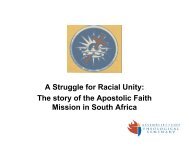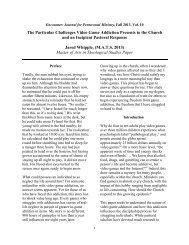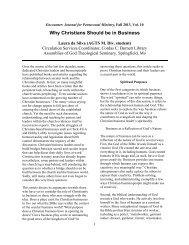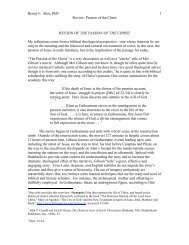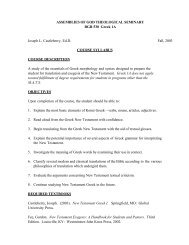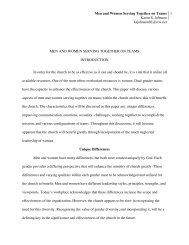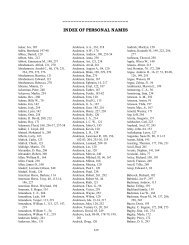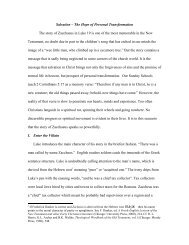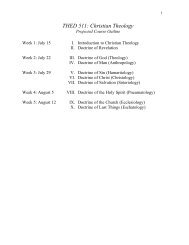Encounter: Journal for Pentecostal Ministry - Assemblies of God ...
Encounter: Journal for Pentecostal Ministry - Assemblies of God ...
Encounter: Journal for Pentecostal Ministry - Assemblies of God ...
You also want an ePaper? Increase the reach of your titles
YUMPU automatically turns print PDFs into web optimized ePapers that Google loves.
16 Ibid., 238.<br />
17 The task is undeniably ominous. A shift has taken place from an older monastic-type piety which rejected<br />
greed and affluence <strong>for</strong> the sake <strong>of</strong> <strong>God</strong>‟s blessings through simplicity, poverty, and serving others, where individuals<br />
now seek success and as much wealth as they can possibly acquire with as little work as possible, <strong>of</strong>ten regardless <strong>of</strong><br />
the means. See Amjad-Ali & Ruiz, “Betrayed By a Kiss”, 54-66.<br />
18 Amy Black, political science pr<strong>of</strong>essor at Wheaton College, in agreement with Gregory Boyd‟s assessment,<br />
tells <strong>of</strong> his congregation‟s reaction (also briefly mentioned in Boyd‟s introduction) when he delivered his six-part<br />
sermon series dealing with Christianity‟s involvement in politics be<strong>for</strong>e the 2004 elections. While he received the most<br />
praise he had ever received, he also lost 1,000 members <strong>of</strong> his 5,000-member church <strong>for</strong> preaching against the close<br />
alignment <strong>of</strong> Christianity with American politics. He does not say we shouldn‟t participate in politics, but he does say<br />
that the kingdom <strong>of</strong> <strong>God</strong> must not be equated with the pursuits <strong>of</strong> the Religious Right. His book is a timely<br />
contribution to Christian Americans steeped in American civil religion <strong>of</strong> the Right and Left persuasion. Gregory A.<br />
Boyd, The Myth <strong>of</strong> a Christian Nation: How the Quest <strong>for</strong> Political Power is Destroying the Church (Grand Rapids,<br />
MI: Zondervan, 2005), 9-10; and Amy E. Black, Beyond Left and Right: Helping Christians Make Sense <strong>of</strong> American<br />
Politics (Grand Rapids, MI: Baker Books, 2008), 55-6.<br />
19 Black, 17-8.<br />
20 The guilt, <strong>for</strong> Boyd, lays both in the Religious Right and Religious Left camps. For both attempt a fusion to<br />
some degree <strong>of</strong> the kingdom <strong>of</strong> <strong>God</strong> with a preferred version <strong>of</strong> the kingdom <strong>of</strong> the world, whether through specific<br />
programs, particular political philosophies, or national interests. See Boyd, The Myth <strong>of</strong> a Christian Nation, 11.<br />
21 Boyd also argues though that the Religious Left is guilty <strong>of</strong> the same thing when they make the<br />
fundamentalists, the gay bashers, the Christian Coalition, the antiabortionists, and the Religious Right the enemy. This<br />
is simply two versions <strong>of</strong> the kingdom <strong>of</strong> the world fighting each other as Boyd argues. Boyd, The Myth <strong>of</strong> a Christian<br />
Nation, 12.<br />
22 Boyd also prophetically speaks to American Christians when he points out our own hypocrisy and selective<br />
morality, “We evangelicals may be divorced and remarried several times; we may be as greedy and as unconcerned<br />
about the poor and as gluttonous as others in our culture; we may be as prone to gossip and slander and as blindly<br />
prejudiced as others in our culture; we may be more self-righteous and as rude as others in our culture—we may even<br />
lack love more than others in the culture. These sins are among the most frequently mentioned sins in the Bible. But at<br />
least we‟re not gay!” Boyd, The Myth <strong>of</strong> a Christian Nation, 108, 111, 116, 127, 137-8, 147.<br />
23 Politics is certainly a means <strong>for</strong> demonstrating <strong>God</strong>‟s love in action, but that does not mean that a Christian<br />
political party (as is <strong>of</strong>ten proposed) is a valuable pursuit. The diversity <strong>of</strong> the body <strong>of</strong> Christ allows <strong>for</strong> varying<br />
perspectives and allows <strong>for</strong> disagreement and discussion about differing views. An examination <strong>of</strong> the current<br />
Christian perspectives on politics across the different denominations proves this point. Mainline Protestants (1/5 <strong>of</strong> the<br />
electorate) typically highlight the role <strong>of</strong> Jesus as the model <strong>for</strong> Christian morality and thus call <strong>for</strong> political action on<br />
issues <strong>of</strong> justice, equal rights, and racism. Their voting behavior has consequently been closely divided between the<br />
two major parties in the recent past (55% voting <strong>for</strong> Bush in 2004). Evangelicals (1/4 voters) focus on personal<br />
conversion which translates politically into emphasis on „family values‟ and issues <strong>of</strong> individual behavior—abortion<br />
and homosexuality. They have there<strong>for</strong>e become a significant portion <strong>of</strong> the Republican voting bloc, 78 percent <strong>of</strong><br />
them voting to reelect Bush in 2004. Black Protestants (8 percent <strong>of</strong> the electorate) have been known <strong>for</strong> their<br />
theological conservatism and political liberalism (ironically then, the same theological beliefs lead white evangelicals<br />
to the right, lead blacks to the left). Kerry in 2004 received 86 percent <strong>of</strong> the Black Protestant vote, down from the 91<br />
percent that Gore won in 2000. Finally, Roman Catholics (another 1/4 <strong>of</strong> the electorate) emphasize a broad range <strong>of</strong><br />
issues including family, community, and the poor. They have specific stances provided in the Catholic Social<br />
Teaching on abortion, gay marriage, combating poverty, protecting the environment, etc. While historically favoring<br />
the Democratic party, they have been recently more split between them and the Republicans. Fifty-two percent <strong>of</strong> the<br />
Catholic vote went to Bush in 2004. Details from Black, Beyond Left and Right, 75-8.



